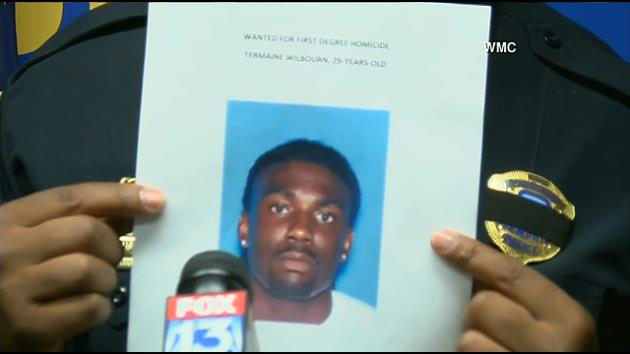By ADRIAN SAINZ
Associated Press
MEMPHIS, Tenn. (AP) — An ex-con accused of fatally shooting a police officer who interrupted a drug deal turned himself in Monday, ending an intensive two-day manhunt, a spokesman for a U.S. attorney said.
Tremaine Wilbourn, 29, was with his family when he arrived at a federal building in Memphis, said Louis Goggans, a spokesman for the U.S. attorney's office.
Wilbourn was a passenger in a 2002 Mercedes Benz that was parked illegally in a southeast Memphis neighborhood on Saturday night, police said. Officer Sean Bolton approached the car, Wilbourn got out of the Mercedes and the two men got into a struggle, police said.
Wilbourn took out a gun and fired, striking Bolton multiple times, and then he and the driver ran away as a civilian used Bolton's radio to notify police about the shooting, authorities said.
The driver later turned himself in to police, and was released without charges. Police sought Wilbourn on a first-degree murder warrant.
Officers said they found about 1.7 grams of marijuana in the car.
Wilbourn was on probation for an armed bank robbery. A sentencing memorandum filed by Wilbourn's lawyer on May 16, 2006, said Wilbourn was persuaded by his uncle to join the robbery to help him with his finances and "he was awaiting news regarding a possible college scholarship based on his athletic ability."
He was sentenced to more than 10 years in federal prison and released on probation in July 2014. He used marijuana in December and was ordered to undergo mental health treatment July 7, according to federal court documents released Monday. It's not clear whether he was ever evaluated.
The documents said witnesses to the officer's shooting identified Wilbourn in a photo lineup.
Wilbourn, who goes by the names Tremaine Martin and "T-Streetz," is a black man who stands over 6-feet-2 and weighs 222 pounds.
Bolton, who was white, was a 33-year-old Marine who served in Iraq. He was the third Memphis officer to be fatally shot in slightly more than four years.
Residents along the street where Bolton was gunned down said their block has been for years a quiet oasis amid the troubled neighborhood around them, where gunshots cut through the night and people are afraid to go outside after dark.
Melvin Norment, whose family has lived on the block for 25 years, said he saw the Mercedes on Saturday night and knew it didn't belong to his neighbors.
"It's not a car I've seen before," he said. "Because I sit outside all the time. I knew it wasn't anybody's car from around here."
Just a few blocks away – at a busy intersection with fast-food restaurants, apartment complexes and an empty lot – police have for years battled drugs and crime in this city long listed among America's most violent.
On Monday morning, yellow crime tape rested in a bundle along the curb on Summerlane Avenue. A vase with yellow, red and white flowers and a white stuffed unicorn had been placed at the scene as a make-shift memorial to the fallen officer.
The street is lined with small, mostly well-kept homes, and neighbors say it has been insulated from the crime erupting around them.
Phillip Price said he lives in Cottonwood Apartments, a few blocks from the shooting.
"We hear gunshots all the time," he said. "There's a lot of people here that carry weapons, that shouldn't be carrying weapons. Some of them are trigger happy. We have seven, eight different gangs in this area."
Michael Williams lives about three blocks from where Bolton was shot. Williams – a police officer, candidate for mayor and president of the Memphis Police Association – said he was in bed two weeks ago and heard 42 gunshots.
When they bought their house eight years ago, "you could be in your front yard and not be concerned, you didn't hear gunshots in the middle of the night, we weren't concerned about going to the gas station at night," he said.
But they've watched the neighborhood deteriorate, he said. Homeowners died off or moved to the suburbs, and the renters that replaced them didn't take the same sort of pride in keeping the streets safe and clean, he said.
"I even told my wife, 'it's looking like it's time to move on,'" he said.
Meanwhile, the number of police officers has dwindled from more than 2,500 in the city to around 2,000, Williams said. Budget cuts dug into officers' pensions and benefits, prompting experienced officers to flee to other departments, in cities with better pay and lower crime rates.
Rank and file officers, he said, are disgruntled and burnt out.
Williams believes the most recent shooting can be traced, at least to some degree, to the fury over police treatment of African-Americans in incidents across the country. Williams estimates that the Memphis police force is around 60 percent African-American, roughly reflective of the city's overall population.
"I think officers are becoming hesitant to react," Williams said. "They don't want to end up in court, or plastered all over the national news."
Copyright 2015 The Associated Press. All rights reserved. This material may not be published, broadcast, rewritten or redistributed.

